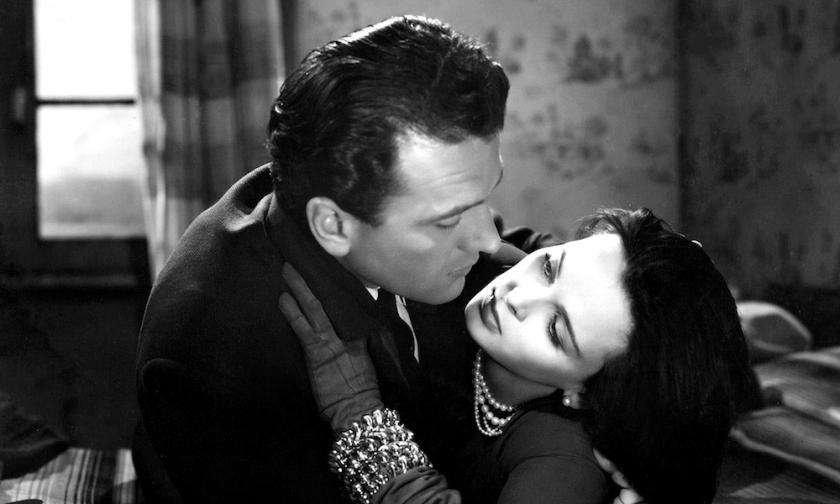The tortuous drama of James M Cain’s 1940’s thriller The Postman Always Rings Twice has inspired many films: the slow-burning mix of erotic desire, temptation, murder and guilt was ideally suited to American film noir, so it’s in some ways surprising to find is as the source of inspiration for Michelangelo Antonioni’s first full-length film (Cronaca di un Amore – Story of a Love Affair) a kind of counterblast to the neo-realism that dominated Italian cinema in 1950, the year of the film’s release.
The story is only loosely based on the Cain classic, more the tawdry spirit than the thrilling letter. The tightly-woven plot, rich in colourful secondary characters, focuses on the passion that connects Paola (the fabulously sultry Lucia Bosè) and Guido (Massimo Girotti). Their recurring love affair is haunted by the death of Paola’s best friend and formerly Guido’s fiancée, an event hovering uneasily between murder and accident. This provides the backstory being investigated by a dogged private detective hired by the super-rich Milanese textile magnate whom Paola, the consummate seductress, has made her plaything and married. The story unfolds with a feeling of tragic inevitability, in a world of stunning frocks, sleek early 1950s Alfas and Maseratis, and deliciously sensual Afro-Cuban music and dance.
Scorsese’s reverence for the film makes total sense when deconstructing the elegant and constantly inventive cinematic language that Antonioni and his cinematographer Enzo Serafini deploy in a way that always strengthens the constantly evolving psychological and emotional aspect of the drama. This is done seamlessly – low and high angle shots, shots that move in a way that heightens tension, surprisingly engaging rear-view and startling top shots, everything that distinguishes the film from classic rulebook cinema. The style rarely draws attention to itself, but resonates with the discrete class of the exquisite clothes and hats, and the fast and sporty cars that play such a pivotal role in the excitement of the movie.
The soundtrack, by Giovanni Fusco, is outstanding and original: with light touches of moody piano and duets with an atmospheric saxophone – a sound well-suited to the sensuality which provides a palpable thread to the story’s almost perverse character. No Hollywood bombast here, or manipulation of the audience’s emotion, but coolly modern, and all the more powerful for being held back rather than overstated.
There are plenty of hints of Antonioni’s distinctive visual setting as well. Architecture plays a crucial part in all his later films, not least La notte (1961), L’aventurra (1960) and Il deserto rosso (1964). The empty streets of Ferrara and the looming business centre of Milan in the 1950 film provide an almost Chiricoesque setting for characters whose existence is an expression of pure alienation – a theme so present in the austere Italian limbo between the war and economic renaissance. As in his later films, Antonioni's men and women are observed with a certain detachment, and yet displaying on their faces all the phases of an emotional turmoil in which desire, love, fear and guilt play themselves out before our eyes. Lucia Bosè – as with Monica Vitti in the 1960s films – is the perfect vehicle for an approach that’s remarkably cool and yet profound, a nearly blank slate upon which the audience can project its fantasies and desires.
The restoration heightens the expressive contrast of lighting and photography. The bonuses include a ‘making of’ with one of the assistant directors, Francesco Maselli as well as some other interviews. This is a celebration of the masterly first splash made by one of the great directors of post-war Italian cinema, and it’s to be welcomed. And yet a featurette on the star of the show, the beautiful and soulful Lucia Bosè – whose brilliant career was interrupted by romance and marriage with the great bullfighter Dominguin, deserves a little more recognition and celebration, alongside Antonioni himself.















Add comment